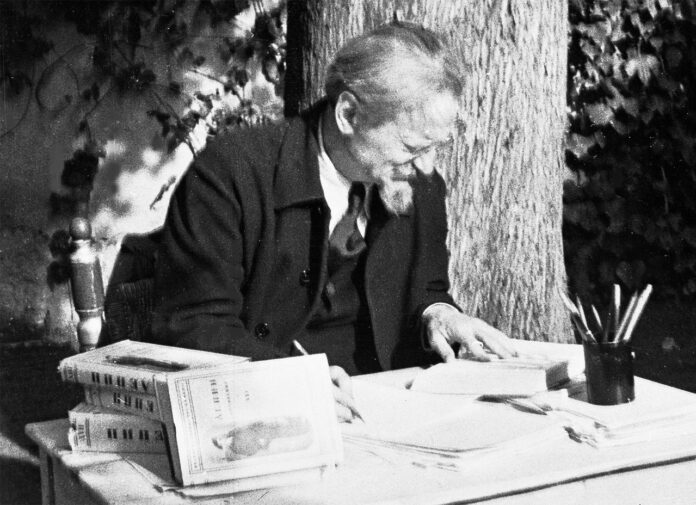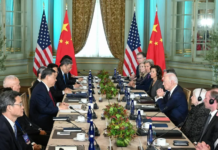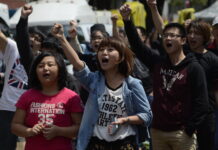Leon Trotsky, January 1931
Some preliminary remarks
- If the theoretical structure of the political economy of Marxism rests entirely upon the conception of value as materialised labour, the revolutionary policy of Marxism rests upon the conception of the party as the vanguard of the proletariat.
Whatever may be the social sources and political causes of opportunistic mistakes and deviations, they are always reduced ideologically to an erroneous understanding of the revolutionary party, of its relation to other proletarian organisations and to the class as a whole.
- The conception of the party as the proletarian vanguard presupposes its full and unconditional independence from all other organisations. The various agreements (blocs, coalitions, compromises) with other organisations, unavoidable in the course of the class struggle, are permissible only on the condition that the party always turns its own face towards the class, always marches under its own banner, acts in its own name, and clearly explains to the masses the aims and limits within which it concludes the given agreement.
- At the basis of all the oscillations and all the errors of the Comintern leadership, we find the wrong understanding of the nature of the party and its tasks. The Stalinist theory of a “two-class party” contradicts the ABC of Marxism. The fact that the official Communist International has tolerated this theory for a number of years, and to this day has not yet condemned it with the necessary firmness, is the most unmistakable sign of the falsity of its official doctrine.
- The fundamental crime of the centrist bureaucracy in the USSR is its false position regarding the party. The Stalinist faction seeks to include administratively in the ranks of the party the whole working class. The party ceases to be the vanguard, that is, the voluntary selection of the most advanced, the most conscious, the most devoted, and the most active workers. The party is fused with the class as it is and loses its power of resistance to the bureaucratic apparatus. On the other hand, the Brandlerites and the other hangers-on of the centrist bureaucracy justify the Stalinist party regime by the philistine reference to the “lack of culture of the Russian proletariat, thus identifying the party and the class, that is, liquidating the party in theory as Stalin liquidates it in practice.
- The basis of the disastrous policy of the Comintern in China was the renunciation of the independence of the party. Practical agreements with the Kuomintang were unavoidable in a certain period. The entrance of the Communist Party into the Kuomintang was a fatal error. The development of this mistake was transformed into one of the greatest crimes in history. The Chinese Communist Party was created only in order to transfer its authority to the Kuomintang. From the vanguard of the proletariat, it was transformed into the tail of the bourgeoisie.
- The disastrous experiment with the Anglo-Russian Committee was based entirely upon trampling under foot the independence of the British Communist Party. In order that the Soviet trade unions might maintain the bloc with the strikebreakers of the General Council (allegedly in the state interests of the USSR!), the British Communist Party had to be deprived of all independence. This was obtained by the actual dissolution of the party into the so-called Minority Movement, that is, the leftist opposition inside the trade unions.
- The experience of the Anglo-Russian Committee was unfortunately the least understood and grasped even in the Left Opposition groups. The demands for a break with the strikebreakers appeared even to some within our ranks as sectarianism. Especially with Monatte, the original sin which led him into the arms of Dumoulin was most clearly manifested in the question of the Anglo-Russian Committee. Yet, this question has a gigantic importance: without a clear understanding of what happened in England in 1925-26, neither Communism as a whole nor the Left Opposition in particular will be able to make its way to a broad road.
- Stalin, Bukharin, Zinoviev – in this question they were all in solidarity, at least initially – sought to replace the weak British Communist Party by a “broader current,” which had at its head, to be sure, not members of the party, but “friends,” almost-Communists, at any rate fine fellows and good acquaintances. The fine fellows, the “solid leaders,” did not, of course, want to submit themselves to the leadership of a small, weak Communist Party. That was their full right; the party cannot force anybody to submit himself to it. The agreements between the Communists and the “lefts” (Purcell, Hicks, Cook) on the basis of the partial tasks of the trade union movement were, of course, quite possible and in certain cases essential. But on one condition: the Communist Party had to preserve its complete independence, even within the trade unions, act in its own name in all the questions of principle, criticise its “left” allies whenever necessary, and in this way win the confidence of the masses step by step.
This only possible road, however, appeared too long and uncertain to the bureaucrats of the CI. They considered that by means of personal influence upon Purcell, Hicks, Cook and the others (conversations behind the scenes, correspondence, banquets, friendly backslapping, gentle exhortations), they would gradually and imperceptibly draw the leftist opposition (“the broad current”) into the bed of the Communist International. To guarantee such a success with greater security, the dear friends (Purcell, Hicks and Cook) were not to be vexed or exasperated or displeased by petty chicanery, by inopportune criticism, by sectarian intransigence, and so forth. But since one of the tasks of the Communist Party consists precisely of upsetting the peace of and alarming all centrists and semi-centrists, a radical measure had to be resorted to by actually subordinating the CP to the Minority Movement. On the trade union field appeared only the leaders of this movement. The British Communist Party had practically ceased to exist for the masses.
- What did the Russian Left Opposition demand in this question? In the first place, to re-establish the complete independence of the British Communist Party in relation to the trade unions. We affirmed that it is only under the influence of the independent slogans of the party and of its open criticism that the Minority Movement could take form, appreciate its tasks more precisely, change its leaders, fortify itself in the trade unions while consolidating the position of Communism.
What did Stalin, Bukharin, Losovsky and Company reply to our criticism? “You want to push the British Communist Party onto the road of sectarianism. You want to drive Purcell, Hicks and Cook into the enemy’s camp. You want to break with the Minority Movement.”
What did the Left Opposition rejoin? “If Purcell and Hicks break with us, not because we demand of them that they transform themselves immediately into Communists – nobody demands that! – but because we ourselves want to remain Communists, this means that Purcell and Company are not friends but masked enemies. The quicker they show their real nature, the better for the masses. We do not at all want to break with the Minority Movement. On the contrary, we must give the greatest attention to this movement. The smallest step forward with the masses or with a part of the masses is worth more than a dozen abstract programs of circles of intellectuals, but the attention devoted to the masses has nothing in common with capitulation before their temporary leaders and semi-leaders. The masses need a correct orientation and correct slogans. This excludes all theoretical conciliation and all protection of confusionists who exploit the backwardness of the masses.”
- What were the results of the British experiment of Stalin? The Minority Movement, embracing almost a million workers, seemed very promising, but it bore the germs of destruction within itself. The masses knew as the leaders of the movement only Purcell, Hicks, and Cook, whom, moreover, Moscow vouched for. These “left” friends, in the first serious test shamefully betrayed the proletariat. The revolutionary workers were thrown into confusion, sank into apathy, and naturally extended their disappointment to the CP itself, which had only been the passive part of this whole mechanism of betrayal and perfidy. The Minority Movement was reduced to zero; the Communist Party returned to the existence of a negligible sect. In this way, thanks to a radically false conception of the party, the greatest movement of the English proletariat which led to the general strike, not only did not shake the apparatus of the reactionary bureaucracy, but on the contrary, reinforced it and compromised Communism in Great Britain for a long time.
- One of the psychological sources of opportunism is a superficial impatience, a lack of confidence in the gradual growth of the party’s influence, the desire to win the masses by organisational manoeuvres or personal diplomacy. Out of this springs the policy of combinations behind the scenes, the policy of silence, of hushing up, of self-renunciation, of adaptation to the ideas and slogans of others; and finally, the complete passage to the positions of opportunism. The subordination of the CP to the Kuomintang in China, the creation of workers’ and peasants’ parties in India, the subordination of the British party to the Minority Movement, etc., etc. – in all these phenomena we see the same method of bureaucratic combinationism which commences with a superficial revolutionary impatience and finishes with opportunist treason. [1]
That is precisely why we have constantly insisted in these last few years upon the enormous educational importance of examples of the Comintern’s strategy cited above. They should be studied and checked all over again at each fresh experience, not only in order to condemn the historical mistakes and crimes after the fact, but to learn to discern similar errors in a new situation at their very inception and consequently while they can still be corrected.
- It must be said directly: the mistakes of some French Oppositionists, members of the League, on the trade union question reveal striking traits of resemblance with the lamentable British experiment. Only, the scale of the errors in France is as yet much smaller, and they have not developed on the basis of a mass movement. This permits certain comrades to overlook these mistakes or to underestimate their importance in principle. Nevertheless, should the League similarly permit its trade union work to be carried on in the future by the methods formulated by the majority of the old leadership, the ideas and the banner of the Left Opposition would be compromised in France for a long time to come.
It would have been criminal to close one’s eyes to this. Since there has been no success in rectifying these errors in their initial stage by means of private advice and warnings, then there only remains to name these errors and their authors openly in order to rectify the policy through collective efforts.
- Beginning with April 1930, the League, in effect, gave up independent work in the trade unions for the benefit of the Unitary Opposition which, on its part, strives to have its own platform, its leadership, its policy. Within these limits we have a striking analogy with the experiment of the Minority Movement in England. It must, however, be said that in the French circumstances there are certain features which, from the very beginning, render this experiment still more dangerous. In England, the Minority Movement as a whole was more to the left than the official leadership of the trade unions.
Can this be said of the Unitary Opposition? No. In the ranks of the latter there are elements who are obviously tending towards the Right Opposition, that is, towards reformism. Their specific weight is not as yet clear to us.
The principal force of the Unitary Opposition is the Teachers’ Federation. In France, the teachers have always played a serious role in socialism, in syndicalism, and in Communism. Among the teachers, we shall no doubt find many friends. Nevertheless, the federation as a whole is not a proletarian federation. Because of its social composition, the Teachers’ Federation can furnish very good agitators, journalists, and individual revolutionaries, but it cannot become the basis of a trade union movement. All its documents bespeak an insufficient clarity of political thought. The Marseilles congress of the federation demonstrated that its members oscillate in a triangle between the official course, the Left Opposition, and the Right Opposition. We would render the worst service to the members of the federation, as well as to the whole proletarian movement, if we were to cover up their mistakes, their vacillations, their lack of precision. Unfortunately, up to a few days ago this was the policy of the editorial board of La Verité – a policy of silence – and this was not by chance.
- Then you want to break with the Unitary Opposition? Whoever poses the question this way says by this alone that the Communists, as Communists, cannot participate in the work of the Unitary Opposition. But if this were the case, it would signify quite simply that the Unitary Opposition is an organisation of the masked enemies of Communism. Happily, this is not so. The UO as a whole is neither a Communist nor an anti-Communist organisation, because it is heterogeneous. We are obliged to take this heterogeneity into account in our practical activity. We can and must display the greatest attention towards groups and even towards individuals who are developing towards Marxism. But all this on one condition: that when we appear before the workers in the trade unions, we act in the name of the Communist League without admitting any censorship of our acts except the control of the League itself (or the whole party after the re-establishment of the unity of the Communist ranks).
- In the ranks of the Unitary Opposition there are indisputably elements who sympathise strongly with the Left Opposition without being members of the League; they must be brought together under our banner. There are indefinite elements who strive with all their strength to remain in this position, transforming it into a “platform.” With these elements, we can have tactical agreements on a definite basis, preserving full freedom of mutual criticism. Finally, in the ranks of the UO there are also, indisputably, alien elements, who strayed there accidentally, or who penetrated it as recruiting agents of reformism. They make use of obscurity in order to bring about the UO’s decomposition. The sooner they are unmasked and eliminated, the better it will be for the cause.
- But aren’t we for collaboration with all workers in the trade unions, regardless of their political and philosophical views? Certainly, but the UO is not a trade union organisation; it is a political faction having as its task to influence the trade union movement. Let us leave it to Monatte and his friends the POP-ists to act under a mask. Revolutionaries act openly before the workers. In the UO we can work only with those who go side by side with us, in the same direction, even though not to the end of our road.
- Certain comrades insist above all that the Communists must fight for their influence on the trade unions by means of ideas and not by mechanical means. This thought, which may seem incontestable, is frequently converted into an empty commonplace. The centrist bureaucracy also declares quite frequently, and quite sincerely, that its task is to influence by ideas and not to exercise a mechanical pressure.
The whole question, in the last analysis, is reduced to the political and economic orientation, to the slogans and the program of action. If the orientation is right, if the slogans correspond to the needs of the moment, then the masses in the trade unions experience no “constraint.” On the contrary, if the orientation is wrong, if the policy of revolutionary ascent is proclaimed at the moment of political ebb, and conversely, then the mass inevitably takes this as a mechanical pressure upon it. The question consequently is reduced to whether the theoretical premises of the Left Opposition are sufficiently serious and profound, if its cadres are sufficiently educated to evaluate the situation correctly and to advance the corresponding slogans. All this must be tested in practice. It is therefore all the more impermissible for us to pass over in silence or to underestimate the sins and the mistakes of our temporary allies as well as of ourselves.
- Certain members of the League, incredible as it may seem, protest against the intention of somebody or other to subordinate the UO to the League.
Without realising it, they base themselves on the same wretched argument that Monatte uses against Communism as a whole. In practice, it means that some comrades working in the trade unions want full independence from the League for themselves; they think that by their manoeuvres, admonitions, and their personal tact they will achieve results that the League cannot attain by collective work. Other comrades, who would like a similar independence for themselves in the press, welcome these tendencies. The question arises: Why did these comrades join the League if they have no confidence in it?
- How do matters really stand in regard to the “subordination” of the Unitary Opposition? The very question is false. Only its own members are subordinated to the League. As long as the majority of the Unitary Opposition is not in the League, it is a question only of persuasion, compromise, or bloc, but certainly not subordination. In fact the opponents of the so-called subordination of the Unitary Opposition to the League are demanding the effective subordination of the League to the UO. This was precisely the situation until today. In its trade union work, i.e., in its most important work, the League is subordinated to the Unitary Opposition, for whose benefit it has renounced all independence. Marxists cannot and must not tolerate such a policy – not even for one more day.
- Certain leading comrades, who obstinately conducted a policy of capitulation up to yesterday, declare today that they are “completely in agreement’ on the necessity of transforming the UO into a bloc. In reality, they want to content themselves with a change of name. The quicker they “agree” with the Marxist criticism, the more they conduct, in actuality, a struggle for everything to remain as before. They simply want to utilise the phraseology of the Marxist criticism in order to cover up the old policy. These methods are not new, but time does not render them more attractive. A revolutionary organisation would be corrupted for a long time, if not forever, by the poison of duplicity and falsehood if it permitted an opportunist policy to mask itself with revolutionary phraseology. Let us firmly hope that the League will not permit this.
Prinkipo,
January 4, 1931
Notes
[1]The leading comrades in the United States inform us that in the American league certain comrades – to be sure, only individual ones (in the literal sense of the word) – speak for the bloc with the Lovestoneites in the name of “mass work.” It is hard to imagine a more ridiculous, a more inept, a more sterile project than this. Do these people know at least a little of the history of the Bolshevik Party? Have they read the works of Lenin? Do they know the correspondence of Marx and Engels? Or has all the history of the revolutionary movement passed them by without leaving a trace? Fortunately, the overwhelming majority of the American league has nothing in common with such ideas. – L.T.




